Civil Liberties, Criminalizing Dissent, Habeas Corpus, Human Rights, Military Tribunal, Supreme Court, Torture, Truth to Power
Podcast: Play in new window | Download
Updates:
——
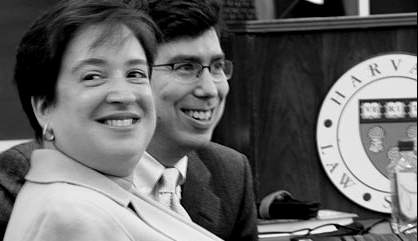
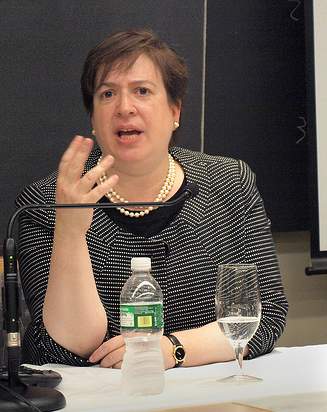
Kagan “Loves” the Federalist Society
Hosts discuss Elena Kagan’s background with Francis Boyle, Professor of law at the University of Illinois. Boyle is author of “Tackling America’s Toughest Questions.” In his article titled – – Supreme Court Pick: Kagan “Loves” the Federalist Society, – – Boyle notes Kagan explicitly endorsed the Bush administration’s bogus category of ‘enemy combatant,’ whose implementation has been a war crime in its own right. He also writes that “Kagan has actually said ‘I love the Federalist Society.’ Almost all of the Bush administration lawyers responsible for its war and torture memos are members of the Federalist Society. Read – Dean Elena Kagan: Harvard’s Gitmo Kangaroo Law School — The School for Torturers
Law Professor, Francis Boyle:
- She has fully defended the hideous Bush atrocities, civil rights, human rights, civil liberties.
- No retreat or abandonment of the Bush positions.
- She (Kagan) did write this tome in the Harvard Law Review, equivalent to the Federalist Society, unitary executive power theory of the presidency.
- She’d be a total disaster on the cases that really count for the future of the US Constitution and the Bill of Rights.
- She’s a neo-conservative and has no qualifications to speak of.
- (She) hired Jack Goldsmith, author of torture memos and helped set up kangaroo court system in Guantanamo. We are still fighting Kagan supporting the Bush war on terrorism.
- Kagan stated on National Public Radio on December 22, 2009, “I Love The Federalist Society”
- Obama and his people know that Kagan will be the spear carrier for presidential powers on the Supreme Court
- This is a very dangerous time for the future of our republic and Constitution. The statement that she cares for the common people. . . she’s an elitist snob.
- There she is promoting globalization at Harvard Law School?? Hiring people to teach “globaloney” just to lick the boots of Larry Summers? While dean at Harvard Law School, she was moonlighting at Goldman Sachs payroll.
- This is all incredibly incestuous. Unlike Bush who wasn’t a lawyer, Obama taught Constitutional Law at the University of Chicago Law School, he should know better.
Guest – Professor Francis Boyle, A scholar in the areas of international law and human rights, Professor Boyle received a J.D. degree magna cum laude and A.M. and Ph.D. degrees in political science from Harvard University. Prior to joining the faculty at the College of Law, he was a teaching fellow at Harvard and an associate at its Center for International Affairs. He also practiced tax and international tax with Bingham, Dana & Gould in Boston.
He has written and lectured extensively in the United States and abroad on the relationship between international law and politics. His eleventh book, Breaking All the Rules: Palestine, Iraq, Iran and the Case for Impeachment was recently published by Clarity Press. His Protesting Power: War, Resistance and Law has been used successfully in anti-war protest trials.
——-

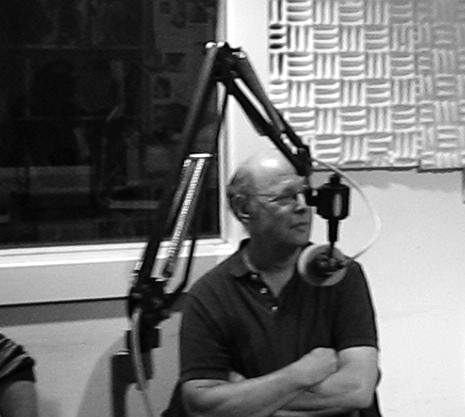

In Memory of Attorney Rhonda Copelon
Hosts talk with Cathy Albisa, executive director of the National Economic and Social Rights Initiative. about the human rights legacy of Rhonda Copelon. Rhonda had a huge influence on changing international law for human rights. She founded the International Women’s Human Rights Law Clinic.
Lawyers You’ll Like series with Rhonda Copelon. Part 1 / Part 2.
Attorney Cathy Albisa:
- I worked with Rhonda at CUNY, we both co-counseled with CCR on a couple of cases.
- I met Rhonda on a car ride, a 25 hour car ride. We spent 25 hours talking about human rights in the United States. Rhonda had a huge influence on NESRI
- Rhonda never stopped lamenting Harris v McRae, she was still furious and outraged.
- The assumption embedded in that case is the court is saying, we’re not responsible as a society, the poverty of this woman. Copeland Fund For Gender Justice. Rhonda thought it was critical that a progressive gender perspective be embedded into some body of work that really looked at these gender issues in a cross cutting way, that understood the relevance of poverty, the relevance of race, the relevance of sexual minorities.
- Rhonda was not a wealthy woman, she was a law professor and saved her money. She gave 1 million dollars for this fund and that was everything. The case that she says always saved my life was Filártiga v. Peña-Irala.
- She founded the International Women’s Human Rights Law Clinic. What she did with that clinic is challenge the traditional model of human rights law coming out of the United States.
- She made no claims of being objective, she was on the side of victims, of people with similar politics to her own.
- This changed international law. Rhonda: Don’t disregard the banal, the ordinary things that actually represent deep violations.
- The way Rhonda went about things, she merged intellectual capital with a strategic ferocity and personal good will and relationship building.
- She thought it was very important that people understand they’re part of a broad social justice and human rights movement.Cathy Albisa joins us today to talk about her work with the National Economic and Social Rights Initiative and Rhonda’s work as legal adviser to the Women’s Caucus for Gender Justice.
Guest- Cathy Albisa, is a constitutional and human rights lawyer with a background on the right to health. Ms. Albisa also has significant experience working in partnership with community organizers in the use of human rights standards to strengthen advocacy in the United States. She co-founded NESRI along with Sharda Sekaran and Liz Sullivan in order to build legitimacy for human rights in general, and economic and social rights in particular, in the United States.
——————————————–
Afghanistan War, Civil Liberties, Human Rights, Iraq War, Targeting Muslims, Torture, Truth to Power, Uncategorized
Podcast: Play in new window | Download
Updates:
—–

Israeli Policy and Palestinian Children – Nora Barrows-Friedman
We talk today with the Nora Barrows-Friedman, she is the host of radio show Flashpoints at KPFA in Berkeley California. Nora spent the last month in the occupied West Bank and East Jerusalem. She’s been investigating stories about the ongoing violations of Palestinian human rights and has been frequently traveling to Palestine since 2004. Today we look specifically at the Israeli policy against children from arresting, detaining, interrogating, torturing, imprisoning and beating children, some as young as 10. Nora says International laws designed to protect children — including the UN convention on the rights of the child are being circumvented and violated on a daily.
Nora Barrows Friedman:
- Kids randomly picked off the street, allegedly for throwing stones. The Israeli punishment is 10 years in prison for a child.
- Israeli military can arrest (Palestinian only) children as young as 12. Right now there are 300 Palestinian children in Israeli prisons.
- Hebron is a city where settlers have been given half of the old city, a settlement colony is inside the Palestinian community
- These two young children were followed and taken into a military center inside the settlement colony.
- This whole family had been destoryed by these illegal actions against these 2 brothers. The only recourse this family has is to take it to the Israeli military court. Motive: trying to get Palestinian families to leave.
- This family lives in an area where settlers have their eye on, seems to be very deliberate.
- There are hundreds of women in Israeli prisons, there’s a story where a woman gave birth in the prison, and the baby is now a prisoner.
Guest – Nora Barrows Friedman: Senior producer and co-host of KPFA’s Flashpoints.
————-
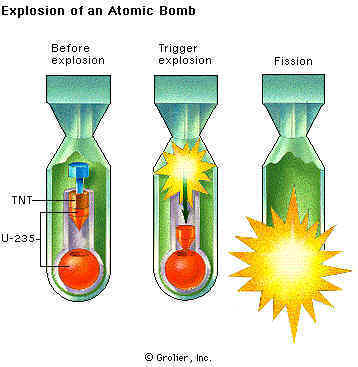

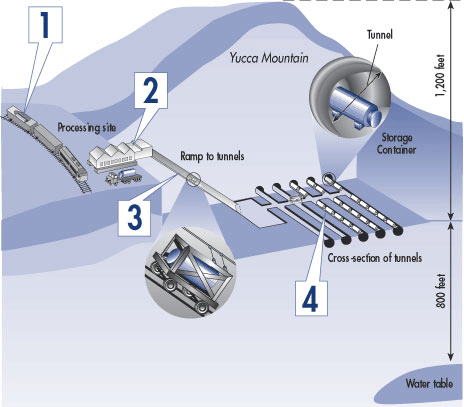
Obama’s Plan for Elimination of Nation-Controlled Nuclear Power
Nine nations now have a combined total of more than 22 thousand nuclear weapons. The United States has about 5 thousand nuclear weapons, 500 of them are land based warheads which can fly in three to four minutes after the order is given. President Obama recently hosted a nuclear security summit in DC with more than 45 foreign leaders, he traveled to Prague and signed a treaty that would cut the combined US and Russian stockpile by a third. Meanwhile, the US nuclear stockpiles have been shrinking for the last 40 years. We talk more about the current nuclear disarmament effort with attorney Peter Weiss is Vice-President, former President, of the International Association of Lawyers Against Nuclear Arms.
Peter Weiss:
- Leave the doomsday clock where it is. Reaffirming of the status quo. The agreement with Russia in reducing the nuclear weapons allowed to each country from 2200 to 1500. They count all the warheads on a bomber plane as one, instead of 10 or 12 weapons.
- Jimmy Carter: A single nuclear armed submarine had enough weaponry to destroy every Russian city of 100 thousand or more.
- Nuclear Posture Review – Zero document / “It’s difficult to operationalize a vision.”
- Obviously there is a great danger of loose nukes. No one seems ready to adopt an anti-nuclear convention except the countries that don’t have nuclear weapons.
- Conference in Riverside Church on May 1, 2010, United For Peace and Justice
- The anti-nuke movment will be re-energized.
- The US wants to be the sole repository of weapons grade nuclear material, committment from Chile, and Canada, to ship WGNM to the US. That’s kind of weird isn’t it?
Guest – Peter Weiss, former Vice President, Center for Constitutional Rights and Vice President, of the International Association of Lawyers Against Nuclear Arms.
——
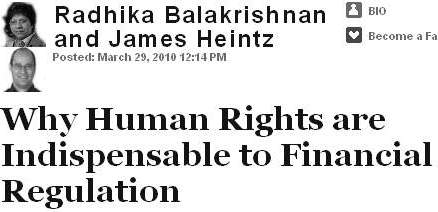

Why Human Rights are Indispensable to Financial Regulation
Today we speak with Radhika Balakrishnan, Professor of Economics and International Studies at Marymount Manhattan College, about her recent article in the Huffington Post titled Why Human Rights are Indispensable to Financial Regulation. Balakrishnan enumerates the global human fallout from the world financial crisis. The World Bank estimates an additional 400 thousand children will die before their fifth birthday, while those responsible for the turmoil are benefiting from bailouts and promotions. She references the Universal Declaration of Human Rights and its inclusion of economic and social rights, that is the right to work, to education, to rest, to an adequate standard of living. Dr. Balakrishnan has also outlined steps for meaningful reform that we will also examine today. She is currently working on a project trying to use human rights norms to evaluate and construct macroeconomic policy.
Radhika Barakrishnan:
- We pretend there is no criteria regulating (economic policies) We argue in our piece, that human rights have a way to set up an ethical basis and framework. Most people don’t know that human rights include economic and social rights.
- In the United States the assumption is you can vote the people in to give you social and economic rights.
- The idea that the market is this Greek Oracle that we can’t question. . . is a problem.
- We’re saying there is a form of biased market regulation, where the state has the interest of the financiers and the banks.
- and not those of the working people and the working class. One example is the minimum wage.
- The Federal Reserve has a dual mandate, one is to have price stability, the other is the right to work.
- In the United States, we have not signed the Convenant on Economic and Human Rights.
- The Federal Reserve is a government agency and the fact that they act in a cloak of secrecy is a real problem.
- I think there is a great case to be brought, as far as freedom of information.
- What kind of financial models are they using to make their decisions? This cloak of secrecy because you independence to make monetary policy? But independence doesn’t mean secret.
- Their Board of Governors are from the commercial banks, whose interest will they work for?
- Bailout Bill – TARP / This went to financial agencies to give them the money. 720 Billion dollars overnighted to the Federal Reserve has not gone out? The Stimulus Money, for employment creation, though it was used for tax cuts.
- Congress did not extend unemployment benefits for Spring recess.
- The United States is coming up for the Universal Periodic Review in the Human Rights Council of Geneva
- The Center for Women’s Global Leadership
Guest – Radhika Balakrishnan, Executive Director of the Center for Women’s Global Leadership and Professor in Women’s and Gender Studies. She has a Ph.D. in Economics from Rutgers University. Previously, she was Professor of Economics and International Studies at Marymount Manhattan College. She has worked at the Ford Foundation as a program officer in the Asia Regional Program. She is currently the Chair of the Board of the US Human Rights Network and on the Board of the Center for Constitutional Rights. She has published in the field of gender and development.
——————————————————————————
Afghanistan War, Civil Liberties, FBI Intrusion, Habeas Corpus, Human Rights, Prison Industry, Surveillance, Targeting Muslims, Torture
Podcast: Play in new window | Download
Updates:
—–
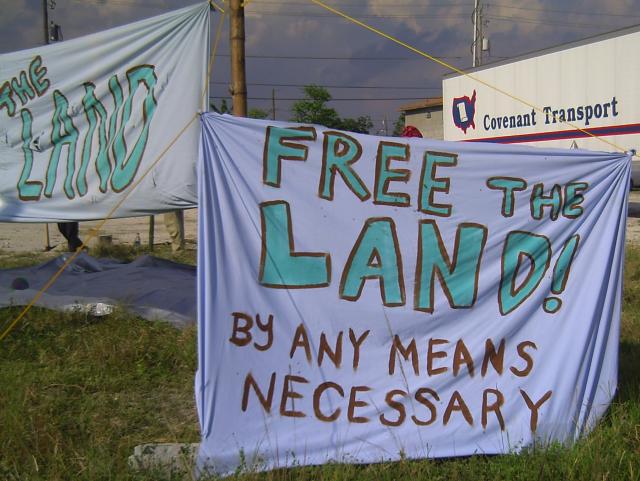
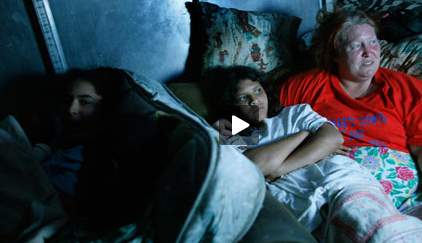
Take Back The Land and The Center For Constitutional Rights Delegation To South Africa
The national movement, Take Back the Land has demanded housing for the homeless in Miami, New York City and is in South Africa to engage in anti-eviction and land reform work. Lawyers with the Center for Constitutional Rights will also join Take Back the Land and provide legal support to the social justice movements. The two groups will be in Cape Town with the Anti-Eviction Campaign and 3 days in Durban with Abahlali bs Mjondolo or (ABM). Among the core beliefs of this project called the Center for Pan African Development are, land is an essential element of liberation, the black community must collectively control land in the black community and the path to liberation is pave through self-determination, not the accommodation of those in power.
Sunita Patel:
- The history of Apartheid is so connected to land and redistribution of land. We spent a few days in Cape Town with the Anti-Eviction Campaign. We traveled to Durban and visited with ABM there. Throughout the trip activists and community members had shared stories of displacement and mass evictions at the government’s hands, without any redress. We have a lot to learn from the movement in South Africa.
- In the United States, we can’t think beyond the private ownership of land.
- Housing is not a constitutionally protected right. Where we can gain from international human rights law, we need to infuse that into our work. The Universal Declaration of Human Rights, recognizes housing as a human right.
- South African Constitution states in articles 26 and 33 affording one house for one family.
Guest – CCR staff attorney, Sunita Patel is involved with racial profiling, immigrant rights and other human rights litigation. Prior to her position at CCR, she held a Soros Justice Fellowship at The Legal Aid Society, Immigration Law Unit in New York where she represented immigrant detainees in removal proceedings and worked with criminal justice and human rights groups to create independent community oversight for detention operations through public accountability boards.
————–
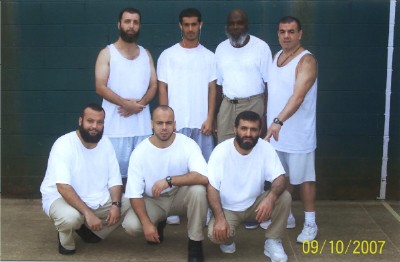

CCR Challenges Experimental Prison Units that Restrict Communication
The Center for Constitutional Rights filed a lawsuit challenging violations of fundamental constitutional rights, including the right to due process, at two experimental federal prison units called “Communications Management Units” (CMUs). The units are being used overwhelmingly to hold Muslim prisoners and prisoners with unpopular political beliefs.
CCR filed Aref v. Holder in the D.C. District Court on behalf of five current and former prisoners of the units in Terre Haute, IN and Marion, IL; two other plaintiffs are the spouses of prisoners. The CMUs were secretly opened under the Bush administration in 2006 and 2007 respectively and were designed to monitor and control the communications of certain prisoners and to isolate them from other prisoners and the outside world. More about Aref
Rachel Meeropol:
- It’s the first time we’ve seen units like this in the federal system. The Bureau of Prisons secretly created these prisons in 2006 and 2007 under the Bush Administration.
- The bureau of prisons initially offered a public comment period and were flooded with comments of what a bad idea this is. They withdrew the public comment and continued to build the prison in secret.
- There’s no meaningful process at all as to who should be put in this unit.
- The Bureau of Prisons has published very broad criteria about the types of individuals, it thinks belongs there.
- The criteria is so broad it could encompass tens of thousands of prisoners.
- When we look at who is being sent the unit, it’s mostly Middle Eastern Muslims, African Americans who have converted to Islam in prison, and also a lot of people with unpopular political views.
- One of our clients Daniel McGowan, is an environmental activist who is serving a term in prison. He never violated a prison rule, he was a low security prison for the first part of his sentence, and then without any reason, he is moved to this highly restricted unit.
- The CMU is an experiment in social isolation. Very few opportunities for visits. Uniquely cruel for individuals who have to undergo it.
- Bad public policy, these individuals are going to be released at some point.
- We are seeking to challenge the extreme limitations on their phone calls and visits.
- Most inmates get 300 minutes a month of phone calls, my clients for years had only one 15 minute call a week.
- For prisoners with large families, this is incredibly difficult. It seems to me this is truly about silencing advocacy from inside the prison.
- Some of our clients including Mr Aref were convicted on terrorism related charges, in his case material support.
- When prisons move prisoners into the CMU of extremely restricted confinement without any process or explanation, of course leads to putting prisoners in the CMU for discriminatory or retaliatory reasons.
Guest – Rachel Meeropol has worked at the Center for Constitutional Rights (CCR) since 2002. She is the co-editor and primary author of the Jailhouse Lawyers Handbook, a widely-requested resource for prisoners, and the editor of America’s Disappeared: Secret Imprisonment, Detainees, and the “War on Terror,” (Seven Stories Press, 2005).
—————–
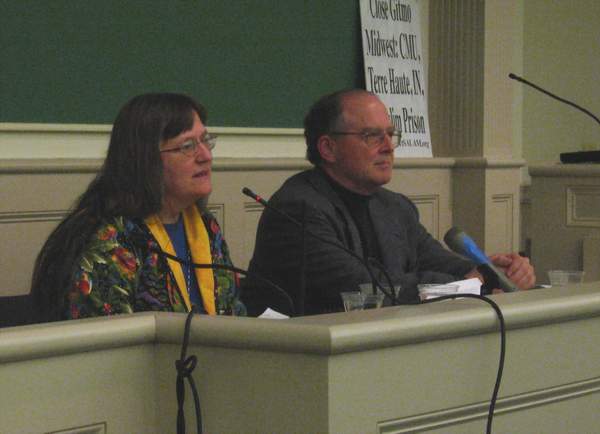
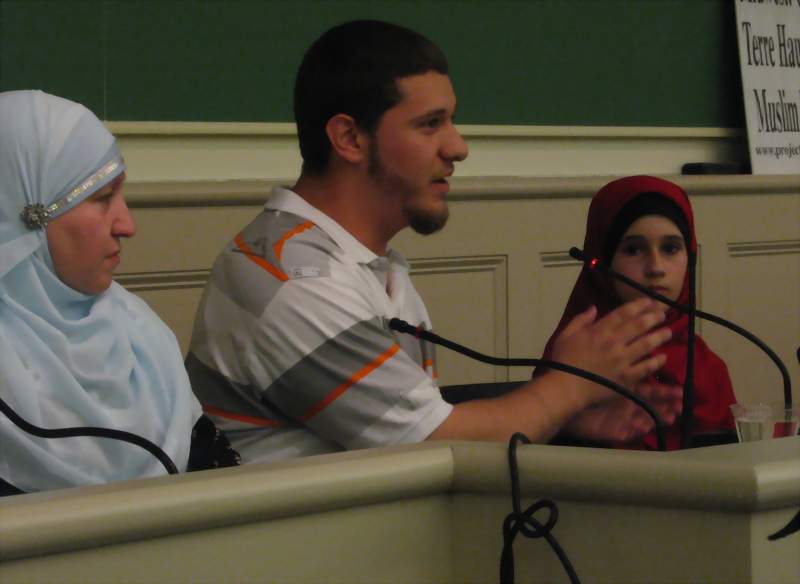
FBI Entrapment: Personal Stories of Preemptive Prosecution
We go now to hear segments from the event titled FBI Entrapment: Personal Stories of Preemptive Prosecution sponsored by the National Lawyers Guild, Middle Eastern Law Students Association (MELSA), Islamic Law Students Association (ILSA) and Law Students for Human Rights.
Families and community members gathered in a room at NYU to discuss their cases, and how their family members were entrapped by FBI informants and agent provocateur tactics. As we have reported in the past years, the FBI have used these tactics to target Muslims and others by offering money and assets within impoverished communities. Some FBI groups target mosques and incite violent action. Most informants are felons, that have made plea-deals with the FBI. As we have seen, these stories make headlines across the country on Memorial Day or the 4th of July, meanwhile, these men implicated in the FBI stings are serving long sentences. We get an inside perspective from their families. We hear from Lynne Jackson and Attorney Stephen Downs from Project Salam. We also hear from 12 year old Lejla Duka, and her cousin, family members with the Fort Dix Five case.
Lynne Jackson / Attorney Stephen Downs
- CCR filed Aref v. Holder in the D.C. District Court
- Aref/Hossain have left behind 2 families, 10 children, ranging in ages 4-16 years old.
- What is going on with our country?
- We formed Project Salam, we need to look at all these case together, there are hundreds of cases.
- We’ve had no response at all from President Obama or Attorney General Holder
- The Cheney one percent doctrine. If there is one percent chance that a Muslim will commit a terrorist act down the road you have to take them out.
- One of the worst things you can do as Muslim is be generous. The government made good use of the material support for terrorism statute.
- Certainly from my point of view, as a lawyer I assume every conversation I have is being monitored. I think all of you should to.
- Check out prisoner database at CMU’s (PDF)
Lynne Jackson, volunteer and co-founder of Project Salam, Attorney Stephen Downs, a retired New York State attorney and a volunteer attorney for the Yassin Aref case. Listen to last year’s Law and Disorder interview.
————————————————————————–
Civil Liberties, Criminalizing Dissent, Human Rights, Iraq War, Torture, Truth to Power
Podcast: Play in new window | Download
Updates:
———————
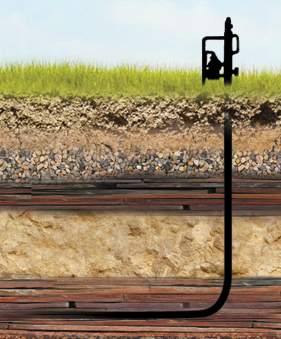
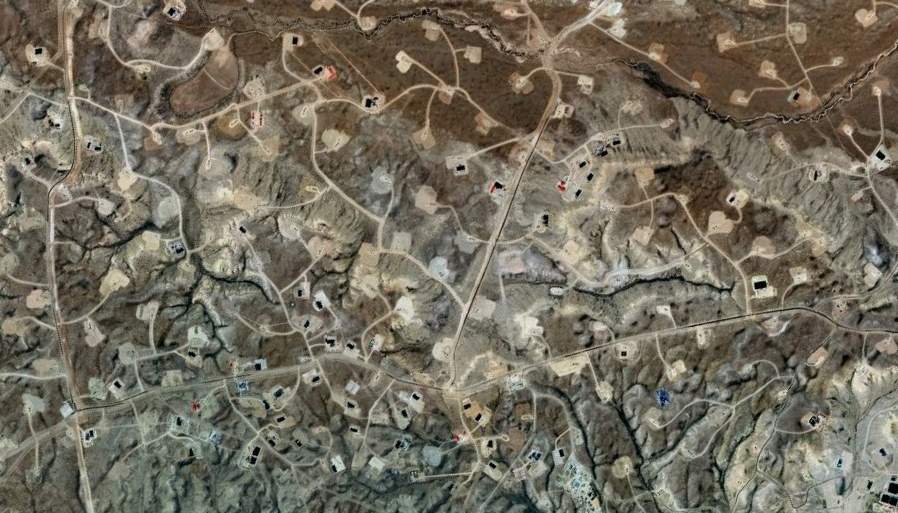
Citizen’s Battle Against Haliburton Gas Drilling Heats Up
Environmental community groups from New York, New Jersey and Pennsylvania gathered last week in Philadelphia, pulling together strategies to protect the Marcellus Shale watershed from natural gas drilling and hydraulic fracturing. The shale is believed to hold some of the world’s largest deposits of natural gas, and those that want to mine this resource say it will reduce dependence on foreign oil and boost the economy. The environmental and public health costs are too high say opponents. They point out that gas drilling causes increased runoff because the water used in drilling won’t be returned to streams.There will be more erosion, water quality will worsen. The lesson is clear from other locations that had the same drilling. Near the Jonah gas field in Wyoming, there was a drop in wildlife of 50%, an increase in crime, loss of businesses, a drop in property values, accidents like wildfires, more traffic, and a greater need for emergency services are some of the impacts of gas drilling. Damascus Citizens Man lights tap water on fire – video
Late last week, the EPA stated it will investigate how hydraulic fracturing will impact water supplies and water quality in New York State. The Upper Delaware River Watershed Basin is the source of pure water for 20 million people in Philadelphia, New York City and half of New Jersey. 171 products and 245 chemicals are used among millions of gallons of water and sand. Halliburton’s gas well drilling process is now exempt from the Safe Drinking Water Act, The Clean Air Act and The Right To Know Act.
Susan Blankensop:
- I live in New York City and I have a part time residency in Pennsylvania.
- In January of 2008, some neighbors of mine starting speaking about these land-men who were coming around the neighborhoods speaking to private land owners, and offering them money for their mineral rights under their land.
- It was all secretive, they said don’t tell your neighbor because I’m offering you a better deal.
- Then we started hearing about this Marcellus Shale and natural gas deposits, hydro fracturing and horizontal drilling. They’re offering 3500.00 an acre with 18 percent royalties.
- Haliburton is the company that developed Hydro-fracturing is where they drill down into these deep shale levels. They go vertically down about a mile then bore horizontally and start setting off mini-explosions. Other companies involved – Chesapeake Energy /Fortuna – Now Talisman Hess
- Explosions – a high velocity mixture of water, chemicals and sand, creating fissures, then the gas escapes up the well. Each time they drill a well, they use an estimate of 5 to 9 million gallons of water, just to drill one well. Each time they fracture a well, it’s another 5-9 million gallons of water, and they can fracture a well multiple times.
- Huge amounts of water, where are they getting the water? Huge amounts of chemicals, 275 different toxic chemicals. After they drill the well, they end up with millions of gallons of industrial waste, this radioactive water. 40-70 percent of it stays underground.
- 90 percent of the New York City’s drinking water comes from ground zero of where Haliburton wants to drill into the Marcelle Shale for natural gas.
- MILLIONS OF ACRES HAVE ALREADY BEEN GIVEN UP FOR DRILLING
- The land owners stand to gain from this, but everybody is going to be affected by the contamination of the water. It’s going to turn the countryside into an industrial zone.
- TIMETABLE: In New York State, they’re (drilling companies) are waiting for the DEC guidelines.
- However, the EPA, came out with a statement, saying that those guidelines were totally inadequate. (No long term, cumulative effects of contamination) The hydro-fracturing, has no federal regulating body.
- Movie Documentary – – Gas Land, Directed by Josh Fox
- Organizing – at this point – stay as local as you can. Each area is different.
- Natural gas burns relatively cleaner than oil and coal, but it’s still a hydrocarbon. It’s still polluting, and the extraction process is highly contaminating.
- NYH2O – Events: Thursday, April 1, 2010 at 7 PM / John Jay College, Gerald W. Lynch Theater /899 10th Avenue @59th Street, NYC
- Symposium and Public Programs for Natural Gas – April 14-15, Cooper Union
Guest – Susan Blankensop, public speaker and member of Damascus citizens a non-profit advocacy group.
—————–

Left Forum: How to Make a Revolution in the US
We hear from our own co-host Michael Smith and Historian Paul LeBlanc who spoke at the Left Forum panel titled, How to Make a Revolution in the U.S. Paul teaches history and political science at LaRoche College.
Historian Paul LeBlanc:
- One percent of the families own 40 percent of the wealth, top 20 percent own 80 percent of the wealth.
- Economic power translates into political power. This is an international reality, this inequality of wealth and power. A revolution involves flipping this.
- So that there is an equal share of wealth and power. An economic democracy that is equal in power throughout the world. The oppressed workers no longer accepting the rulership over them, that’s a revolution and that’s what we need. We have crisis, and capitalism generates crisis.
- The movie Children of Men, shows global demonstrations, but they didn’t change the balance of power in society.
- People who are struggling for social change, can be co-opted by those who have power to repress, make adjustments. We have to oppose Imperialism, extraction industries, for those who own and control multi-national corporations, which exist not to meet the needs of the people of the Earth but to maximize profits for those who have economic power.
- They will do WHATEVER is necessary to maintain power and profit. They’re doing it in Iraq and Afghanistan and threatning to do the same in other regions.
- We have a responsibility to oppose that. Building anti-war movement. I think I’m going to die before we make the revolution. We need to replace Capitalism.
- They thought Obama would end the wars. Obama wanted to be president of the United States empire.
- Anti-war movement weakened. There is a lack of cadre. People who know how make a leaflet, organize a meeting. Who know how to use a series of meetings that will result in a demonstration, and that demonstration will be part of an overarching strategy, that will build an increasing militant and radical majority. We need to develop cadre. A strategic perspective that fights for victories in the here and now.
Speakers – Michael Steven Smith and Historian Paul LeBlanc. Professor LeBlanc graduated from University of Pittsburgh – B.A., M.A., Ph.D. He’s written many books including, “Black Liberation and the American Dream” (2003) / “U.S. Labor in the Twentieth Century” (edited with John Hinshaw, 2000) / “A Short History of the U.S. Working Class” (1999) and “Rosa Luxemburg: Reflections and Writings” (1999)”
————————————————–
Afghanistan War, Civil Liberties, Gaza, Human Rights, Iraq Veterans, Iraq War, Targeting Muslims, Torture, Truth to Power
Podcast: Play in new window | Download
Updates:
—
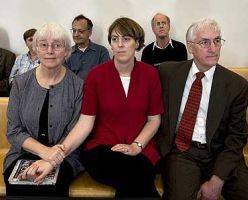
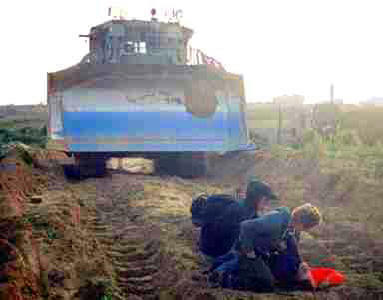
Rachel Corrie wrongful death v Israel
This month, the Haifa District Court in Israel will begin hearing eyewitness testimonies in a civil lawsuit filed in 2005 by Rachel Corrie’s family against the State of Israel for her unlawful killing in Rafah, Gaza. On March 16, 2003, Rachel was crushed to death by a Caterpillar D9R bulldozer while trying to protect the home of a Palestinian doctor from demolition. She was run over and killed by an IDF soldier who was operating the bulldozer. Seven years later, Rachel’s parents are still seeking the truth. The trial is expected to show the circumstances of her death and hold the Israeli military reponsible. Four eyewitnesses to Rachel’s killing have been recently granted visas by Israel to testify but Israel is refusing to allow the Palestinian doctor who treated Rachel and confirmed her death into Israel.
Maria LaHood:
- CCR represented Rachel Corrie in the United States because she was run over by a Caterpillar bulldozer. The same month in 2005, the Corries brought a suit against Israel, in Israel for the killing.
- This suit was on the advice of the US State Department. You can sue Israel, the country. Israel claims immunity.
- Israel’s defense that the bulldozer driver couldn’t see Rachel Corrie in the bright orange jacket.
- Expert witness says Israel’s heavy machinery operator policy says do not use around people.
- Rachel was defending the home and the bulldozer crushed her. Rachel was with the International Solidarity Movement. The Corrie family will present their evidence to the Israeli court and then there’s a 30 day break in the trial. This is not a jury trial, it is before a judge. Corries are asking for information, and accountability.
- In the attacks of Gaza a year ago, more than 4000 houses were demolished.
- Someone was filming at the border at the time of Rachel’s death, the actual part of the tape where she was crushed is missing.
- Mamilla Cemetery Case Update: We’ve asked the special rapporteurs of the United Nations to intervene.
- Michael Ratner: It does seem to be intentionally provocative. To be doing this on a cemetery and calling it the “Center for Tolerance” MamillaCampaign website.
Guest – Staff attorney Maria LaHood. Maria specializes in international human rights litigation, seeking to hold government officials and corporations accountable for torture, extrajudicial killings, and war crimes abroad. Her cases include Arar v. Ashcroft, against U.S. officials for sending Canadian citizen Maher Arar to Syria where he was tortured and detained for a year; Matar v. Dichter, against an Israeli official responsible for a “targeted assassination” that killed 15 Palestinians; Belhas v. Ya’alon, against a former Israeli official responsible for the 1996 shelling of a United Nations compound in Qana, Lebanon, that killed over 100 civilians; Corrie v. Caterpillar, on behalf of Palestinians killed and injured in home demolitions, and Rachel Corrie, a U.S. human rights defender who was killed trying to protect a home from being demolished.
———–
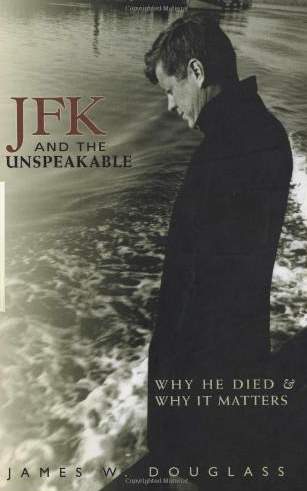
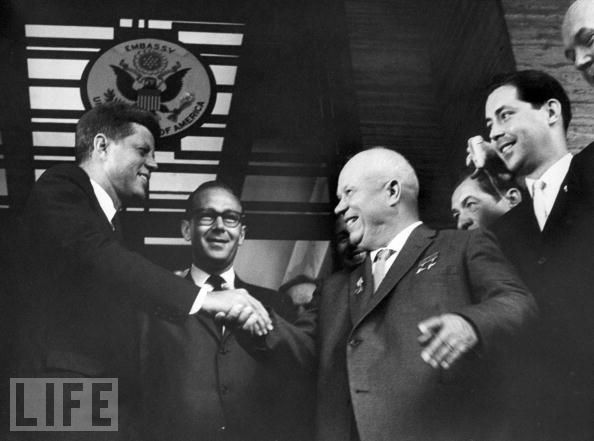
JFK and the Unspeakable: Why He Died and Why It Matters by Jim Douglass
JFK, The Unspeakable, is the first book of 3 on the assassinations of the 1960s. Orbis Books has commissioned author James W. Douglass to write about the murders of JFK, Malcolm X and Martin Luther King, and his the third will be on the assassination of Bobby Kennedy. The heart of JFK the Unthinkable, is not how Kennedy was killed or how Kennedy became a threat to the systemic war machine, but why DID Kennedy die? Author James Douglass says Kennedy knew that he would die and had the guts to stand up to the system and take the hit. This narrative was lost for decades, obscured by disinformation about Kennedy’s character and the conspiracy of his assassination. One review summarizes Douglass’s book in this way : JFK’s belated effort to turn America from an armed culture of victory to a member of an international peaceful world was shot down in Texas for a reason.
Jim Douglass:
- John F. Kennedy’s experience in WWII: He was in the South Pacific, he volunteered. He was on that PT boat.
- What happened on that PT boat, is that it got split into two by a Japanese destroyer. He lost brothers and friends at that time. An extraordinary experience being adrift on the ocean warning other PT boats. The experience create a distrust in military authority.
- He said that he wanted to splinter the CIA into a thousand pieces and scatter to the winds.
- As Kennedy said to his friends, “they figured me all wrong.”
- The Unspeakable: the kind of evil and deceit that seems to go beyond the capacity of words to describe. The midst of war and nuclear arms race, the assassinations of Kennedy, Martin Luther King and Malcom X that the term was used.
- JFK’s vision is articulated in the address June 10, 1963, arising from the turnaround of the missile crisis and Bay of Pigs.
- He wanted to move step by step into a disarmed world. Nikita Khrushchev put that speech all over the Soviet Union. The Cuban Missile Crisis is a deeply misunderstood part of our history, because it’s usually portrayed as Kennedy going to war with Nikita Khrushchev and beating him.
- The truth was that Kennedy and Nikita Khrushchev were in over their heads, the US generals wanted nuclear war, because they had more warheads than the Soviets.
- Nikita Khrushchev: We now have a common enemy from those pushing us toward war.
- At that point the Cold War turned upside down because Kennedy and Khruschev became closer to each other than either was toward their own military power system.
- Vietnam: Kennedy’s military people would not give him an exit policy. He signed the withdrawal order from Vietnam before he was assassinated.
- His friends said that he had an obsession with death. It was not an obsession but a real assessment that he was going to die. If you try to turn around a national security state that is dominating the world,
- and you do so as president of the United States, of course you’re going to die. Kennedy knew that.
- The book is a story on the deliberate destruction of hope, the vision of change, a turning of this country all of which was happening and had to be stopped. US Agencies killed Dr. Martin Luther King – 1999 Verdict
- We’re in the same scene right now with Petraeus and McChrystal setting up Obama. They were dictating terms to Obama, unlike Kennedy, he did not face them down.
- We need to get out ahead of Obama so that he can do something.
Guest -author, James W. Douglass. He’s a longtime peace activist and writer. James and his wife Shelley are co-founders of the Ground Zero Center for Nonviolent Action in Poulsbo, Washington, and Mary’s House, a Catholic Worker house of hospitality in Birmingham, Alabama.
—————————
Civil Liberties, Criminalizing Dissent, Gaza, Human Rights, Prosecution of the Bush Administration, Supreme Court, Surveillance, Targeting Muslims, Torture
Podcast: Play in new window | Download
Updates:
—
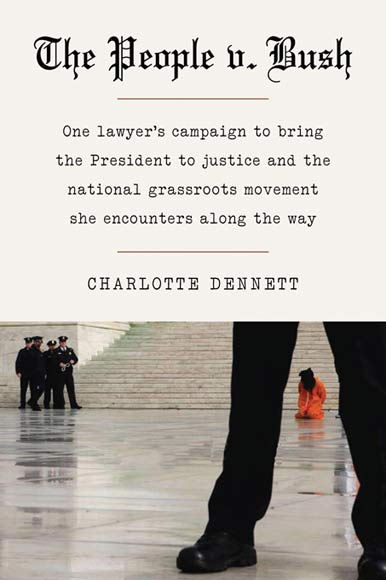
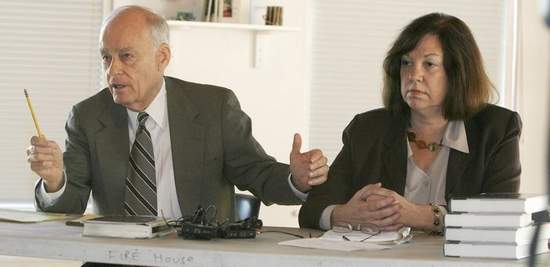
People v Bush, Charlotte Dennett
Today we talk with former Vermont Attorney General Candidate Charlotte Dennett. Listeners may remember Charlotte ran for office of Attorney General on the platform that if elected she would immediately undertake the prosecution of George W. Bush for the unnecessary deaths of Vermont soldiers in Iraq. The strategy was to establish jurisdiction in the cases for Attorneys General in each state as outlined in The Prosecution of George W. Bush for Murder, written by former prosecutor Vincent Bugliosi. Charlotte Dennett didn’t get the votes to become Vermont’s new attorney general. Now, a year later Charlotte describes from an inside perspective the “accountability movement” in her new book titled The People v. Bush. Is impeachment or prosecution still off the table?
Charlotte Dennett:
- If we don’t act on them now, then the impunity will get worse, we have to clamour for Cheney’s prosecution. We’ve got to keep the pressure on the department of justice. We know that the Spanish prosecutors have done that.
- I’ve come to realize that Obama’s mantra that we have to move forward and not look backward is really translated into: Don’t Prosecute.
- Brennan who was involved with crafting torture policy is playing a role advising Obama not to prosecute.
- It’s up to the accountability movement to step forward. There are going to be major events on March 20th, the anniversary of the war on Iraq.
- In my book the People v. Bush, I’ve got 10 pages in the appendix of all the different resources that people can turn to, to pressure Congress, sign petitions.
- The first half of the book is about my campaign for attorney general in Vermont, where I pledged to prosecute Bush for murder. I also lay out the evidence of how we can still do this, we can still do this by the way.
- I became hooked on accountability, this is a struggle for democracy and the soul of our nation.
- The book also looks at how the Obama Administration deals with the crimes of its predecessors.
- I have to tell you Michael Ratner, you were one of the first people to start raising the alarms (Obama Administration). My book shows the gradual shock and disillusionment of his supporters.
- People are upset that John Yoo, is doing talk shows, he showed up on John Stewart recently (OUCH)
- Regarding Sen. Leahy of Vermont: I tracked his effort to put together a truth commission and not prosecution. There were 37 towns in Vermont, that in their town meetings, voted for impeachment.
Guest – Charlotte Dennett, is an author and attorney who resides in Cambridge Vermont. She and her husband, Gerard Colby, have lived in Vermont since 1984. Charlotte has been practicing law since 1997, representing injured Vermonters in negligence, medical malpractice and wrongful death cases, as well as civil rights litigation and family law, and has argued before the Vermont Supreme Court.
——-

Lawyers You’ll Like: Center For Constitutional Rights Legal Director, Bill Quiqley
This week, CCR Legal Director Bill Quigley joined Law and Disorder hosts during a marathon 3 hour fund raiser for Pacifica’s WBAI. Bill talked about his trip to Gaza during Operation Cast Lead, his recent trip to Haiti and his death penalty work in Louisiana.
Bill Quigley:
- I went to Gaza with activist Audrey Stewart and Kathy Kelly, an International Peace Activist.
- We went over there, a year ago January, while the bombing was still going on. We were on the Egyptian side of the border where we could see the bombing of Gaza
- There were constant drones going over head, they had aerial balloons that were doing surveillance. It was sort of like a sociopath beating a baby. There was no defense, there was no anti-aircraft, people were literally sitting ducks.
- In my life, it compared to a time when one of my clients was being executed, in death row in Louisiana. To see the apparatus of the state, move into action, very calm, step by step.
- Then with full force and the respect of state behind it, pull on a switch and my client was no more. (at that time) It was a surprise that anyone in the U.S. would support the Palestinians.
- Death Penalty: there really is a community of deathy penalty advocates who train themselves how to communicate with juries. It is trending in the right direction by it still continues as a terrible tool, that the state has an opportunity to use when they choose to.
- Stop and frisk case update: New York is fighting this every step of the way. The term they use to justify this is: Furtive activity
- Culture of Intimidation: If young men don’t look at them the way they want to be looked at, if people don’t recognize their presence with the kind of respect that the police department thinks that they’re entitled to by the mere fact that they’re wearing a uniform and carrying a weapon.
- It is something that clearly could stop if the message was sent from the top.
- But clearly something has a green light from the top to engage in this. Authoritarian order that inconsistent with law and order, with the constitution.
- Endemic: If you have a society that values violence, the violence we institute around the world, the way we support Israel, the way they deal with Palestine. If we value deep racism, then what else what would we expect from a police or a military. The police and military are tools of a violent and racist regime.
- Part of our job is to re-educate police officers. We are going to be engaged in this activity over again, in every city in the country in varying degrees. The root problem is that we have a racist and violent criminal justice system, education system, a racist and marginalizing housing system, employment system.
- Most people don’t have the educational opportunities to know what’s going on with Haiti, Gaza, Iraq and even within our own country. Haiti: You could travel for miles and see no indication that international community even cared about what happened in Haiti. Most people were under a sheet or a blanket, could break some of the sun.
Guest – Bill Quigley. Bill is the Legal Director for the Center for Constitutional Rights, a national legal and educational organization dedicated to advancing and defending the rights guaranteed by the United States Constitution and the Universal Declaration of Human Rights. Bill joined CCR on sabbatical from his position as law professor and Director of the Law Clinic and the Gillis Long Poverty Law Center at Loyola University New Orleans. He has been an active public interest lawyer since 1977.
———————————————-










